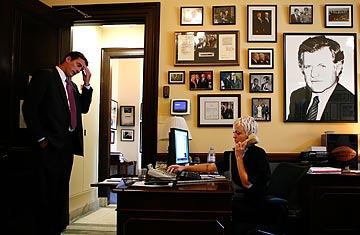
Ted Kennedy's office on Capitol Hill
Ted Kennedy's death was one of those rare events that can pause politics — but nothing can stop politics. Massachusetts now has an open Senate seat for the first time in 25 years, and the maneuvering over his succession has already begun.
The first question is when that succession will happen. A 2004 law calls for the seat to remain vacant until an election in five months. At the time the law was formulated, the Democratic-dominated legislature wanted to prevent then governor Mitt Romney from appointing a Republican if Senator John Kerry became President. But before his death, Kennedy proposed that Governor Deval Patrick be allowed to appoint an interim Senator who pledged not to seek the seat permanently. Today, Patrick endorsed the idea of changing the law to make sure that his state maintains full representation — and that Democrats maintain 60 votes in the Senate. The state house speaker signaled his agreement.
Democrats still control Beacon Hill, and the Democrats who now control Washington fear that the loss of their filibuster-proof majority will imperil Kennedy's cherished cause of health-care reform. But a new law to arrange a senatorial temp is not a done deal. For one thing, the state senate president, though a Democrat, is not close to Patrick. It's not even clear that a flip-flopping political power play to install an interim appointee — the name of former governor Michael Dukakis has popped up — would help pass health-care reform. Democrats on Capitol Hill might be better off keeping Kennedy's seat empty — and then using the sympathy generated by his death as an excuse to ram through health-care legislation by majority vote.
The next question is what Vicki wants. Victoria Reggie Kennedy, the Senator's widely admired widow, is from a Louisiana political family. She has stayed out of Massachusetts politics, and word leaked during the Senator's illness that she wasn't interested in succeeding him. But she would be an overwhelming favorite for the seat if she wanted it, and until she publicly makes her wishes clear, nothing will be clear.
Then there's former Congressman Joseph P. Kennedy II, the late Senator's charismatic and passionate (though not overwhelmingly popular) nephew. He's been away from politics for a decade and hasn't indicated interest in his uncle's seat, but he hasn't indicated non-interest, and he would also be a big favorite. He's got solid Washington experience and $1.7 million in his federal campaign fund — and this is the "Kennedy seat," claimed by JFK in 1952 and passed to Ted in 1962. Of course, the Kennedy name is no guarantee — Caroline, the late President's daughter, recently botched her play for a Senate appointment in New York, and Kathleen, RFK's daughter, lost a governor's race in Maryland. But a Kennedy would be hard to beat in Massachusetts. Especially now.
A Kennedy would probably clear the Democratic field, but a Kennedy-less race would be a free-for-all, not only because Senate seats open up so rarely, but because elected officials would be able to run without risking their day jobs. The favorite from outside the family might be popular Massachusetts Attorney General Martha Coakley, who is likely to be the only woman in the field and the only candidate who has won statewide. But Coakley will start at a fundraising disadvantage because she can't transfer state contributions to a federal account, while several sitting Congressmen are sitting on large war chests.
The most formidable candidates would be Barney Frank and Ed Markey, who were considered the most likely successors to Kerry. But they're both chairmen of powerful House committees overseeing financial services and climate, respectively; sacrificing their seniority for the Senate would be a step down for them. The more likely congressional candidates are Michael Capuano, the liberal former mayor of Somerville, and Steven Lynch, a socially conservative former president of an ironworker's union from South Boston. They each have more than $1 million in their campaign funds. Former Congressman Marty Meehan, best known for authoring campaign-finance legislation, still has about $5 million in his account; he's pledged to keep his job as chancellor of the University of Massachusetts in Lowell, but Senate seats don't pop up every day. Congressmen Richard Neal, James McGovern and William Delahunt aren't expected to run — but hey, they've got nothing to lose if they do. "It'll be a battle and a half," says Phil Johnston, a former Dukakis aide and former head of the state party.
On the Republican side, well, it probably won't matter what happens on the Republican side. Massachusetts often elects Republican governors, but it hasn't sent a Republican to Washington since 1994 — and it hasn't had a Republican Senator since 1979. Names like businessman Jeff Beatty, former lieut. governor Kerry Healey and former U.S. Attorney Michael Sullivan have been thrown around, but it's not clear whether any of them want to be a sacrificial lamb. "A Republican running for federal office in Massachusetts faces a 10-to-15-point drag vs. that same person running for state office," says GOP consultant Rob Gray. "Ever since the Gingrich era, it's been tough."
The candidates will all tread gingerly until after Kennedy is laid to rest — and probably until after Vicki and then Joe make their intentions clear. But even if one of them runs, it's no sure thing that they would do so unopposed. Dynasties don't last forever; the Kennedy seat was once the "Lodge seat," held by Henry Cabot Lodge Sr. and then Henry Cabot Lodge Jr. — before John snatched it from Junior and Ted kept it from Junior's son George. And Ted's passing, after all, is the end of an era.
Download the new TIME BlackBerry app at app.time.com.
